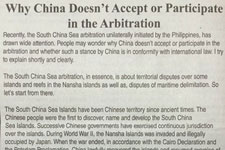On June 10th, 2016, San Francisco Chronicle, the largest-circulation English newspaper in town, published Consul General Luo Linquan's article entitled "Why China doesn't accept or participate in the arbitration". The full text is as follows:

Recently, the South China Sea arbitration unilaterally initiated by the Philippines, has drawn wide attention. People may wonder why China doesn't accept or participate in the arbitration and whether such a stance by China is in conformity with international law. I try to explain shortly and clearly.
The South China Sea arbitration, in essence, is about territorial disputes over some islands and reefs in the Nansha islands as well as, disputes of maritime delimitation. So let's start from there.
The South China Sea Islands have been Chinese territory since ancient times. The Chinese people were the first to discover, name and develop the South China Sea Islands. Successive Chinese governments have exercised continuous jurisdiction over the islands. During World WarⅡ, the Nansha Islands was invaded and illegally occupied by Japan. When the war ended, in accordance with the Cairo Declaration and the Potsdam Proclamation, China lawfully recovered the islands and resumed exercise of sovereignty through such measures as compiling their official names, publishing maps, setting up administrative units and stationing troops. In the several decades that followed, it was widely recognized by the international community that the Nansha Islands belongs to China and not a single country raised objections to it.
Another fact to bring to your attention is that the Philippine territorial scope is defined by the "Treaty of Paris" in 1898, the "Treaty of Washington" in 1900 and the "Convention between the United States and Great Britain" in 1930. These three treaties set 118 degrees' east longitude as the western limit of Philippine territory. You may argue these treaties are signed during the colonial period, but laws of the Philippines in the 1930s, 1940s, 1950s and even 1960s reaffirmed the legal effects of the above-mentioned three treaties. China's Nansha Islands is located west of the 118 degrees' line. That's to say, China's Nansha Islands is not within the territory of the Philippines.
Things began to change under the influence of a report by UN Economic Commission for Asia and the Far East in 1968, indicating rich oil and gas reserves under the South China Sea. Starting from the 1970s, countries like the Philippines scrambled to occupy China's Nansha islands and reefs, and eight were occupied by the Philippines.
Moreover, the Philippines and some other countries have attempted to deny China's sovereignty over the Nansha Islands with their jurisdiction claims on the grounds that the Nansha Islands is located within 200 nautical miles off their coasts. The 200 nautical miles exclusive economic zone (EEZ) regime was only introduced by the United Nations Convention on the Law of the Sea (UNCLOS) in 1982. Though sovereignty disputes and maritime delimitation disputes are totally different in nature, countries like the Philippines deliberately mix up them to mislead the international opinion.
From the perspective of international law, I just want to emphasize two points in the applicability of the UNCLOS to help you understand why the arbitration is a false issue.
First, compulsory arbitration is not applicable to matters beyond the scope of the UNCLOS, which this territorial issue is. They are within the scope of customary international law.
Second, if a dispute involves maritime delimitation, historic bays or ownership, military operations or law enforcement, a State Party has the right to declare non-acceptance of the compulsory arbitration. Such exceptions exert legal effects on other State Parties. In this arbitration case, even assuming some of the claims were concerned with the interpretation and application of the UNCLOS, they would still be an integral part of maritime delimitation, which has been excluded by China through its 2006 Declaration and consequently is not subject to compulsory arbitration. However, in 2013, the Philippines still unilaterally initiated arbitration.
With the above-mentioned historical facts and international law in mind, you may have already drawn a conclusion.
In the end, I want to make it clear that the door for negotiation and consultation is always open, but this false arbitration is not one China can accept or participate in. I come upon a quote by Abraham Lincoln which I feel quite explains China's stance on the false arbitration and like to share with you. "I am not bound to win, but I am bound to be true. I am not bound to succeed, but I am bound to live by the light that I have. I must stand with anybody that stands right, and stand with him while he is right, and part with him when he goes wrong."

